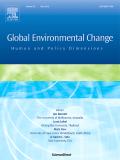China needs to reduce its carbon emissions if global climate change mitigation is to succeed. Conventional economic analysis views cutting emissions as a cost, creating a collective action problem. However, decarbonization can improve productivity and provide co-benefits that accord with multiple national policy objectives. We track China's progress in reducing the emissions intensity of the economy, and construct a macro scenario with China's carbon emissions peaking in the 2020s. Investment in greater energy productivity and economic restructuring away from heavy industries can bring productivity gains, and decarbonization of energy supply has important co-benefits for air pollution and energy security. Combined with lower climate change risks and the likelihood that China's actions will influence other countries, this suggests that cutting carbon emissions is not only in China's self-interest but also in the global interest. To properly identify the true costs and benefits of climate change action requires new thinking in economic analysis.
The paper appears in the Special Issue: Climate Change and Green Growth: New Thinking.
Over the past several years, labeling schemes that focus on a wide range of environmental and social metrics have proliferated. Although little empirical evidence has been generated yet with respect to carbon footprint labels, much can be learned from our experience with similar product labels. We first review the theory and evidence on the role of product labeling in affecting consumer and firm behavior. Next, we consider the role of governments and nongovernmental organizations, concluding that international, multistakeholder organizations have a critical part to play in setting protocols and standards. We argue that it is important to consider the entire life cycle of a product being labeled and develop an international standard for measurement and reporting. Finally, we examine the potential impact of carbon product labeling, discussing methodological and trade challenges and proposing a framework for choosing products best suited for labeling.
This article appeared in the Energy Economics Supplemental Issue: Green Perspectives.

The rhetorical zeal for green enterprise as a global fix for the tripartite challenges of economic recession, environmental degradation and social inequality is increasingly visible in state and non-state pronouncements around the globe under the banner of ‘The Green Economy’. In particular, many policy-facing statements call for transitions leading to a transformation in development practices. Yet there is little detail either in policy or research regarding the types of transitions needed and how they are to be initiated, nor agreement about what a transformed economy might look like. Despite this, there are emergent activities within the cleantech arena which are being heralded as actually existing examples of green economy activities. One means through which these activities are seeking to exert influence over development trajectories is by clustering both at the subnational and transnational level. While diverse in formation, many of these clusters are hybridised, involving actors from public, private and civil society sectors.
This report reviews the skills available and skills required for the introduction and deployment of green technologies in the steel industry in India. It reviews the existing systems in place for developing a skilled labour force and proposes some specific recommendations on how to adapt to evolving demands. The report provides evidence and new information to contribute to a tripartite dialogue on promoting access to skills for green jobs and the greening of existing jobs in the Indian steel sector to create decent, productive work and to improve the competitiveness and environmental sustainability of the industry.
This report reviews in a systematic manner the skills available and skills required for the introduction and deployment of green technologies in the cement industry in Indonesia. It reviews the existing systems in place for developing a skilled labour force and proposes some specific recommendations on how to adapt to evolving demands. This report builds on continuing efforts made by the International Labour Organization in reviewing the need for skills for green jobs and the development of sector-based analysis for advancing global research work on promoting decent work. The report provides evidence and additional new information to support a tripartite dialogue on the best approach for promoting access to skills for green jobs and the greening of existing jobs in the Indonesian cement industry to create decent, productive work and to improve the environmental sustainability and competitiveness of the sector.
